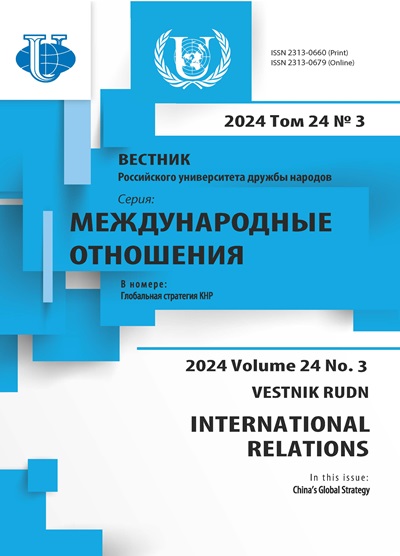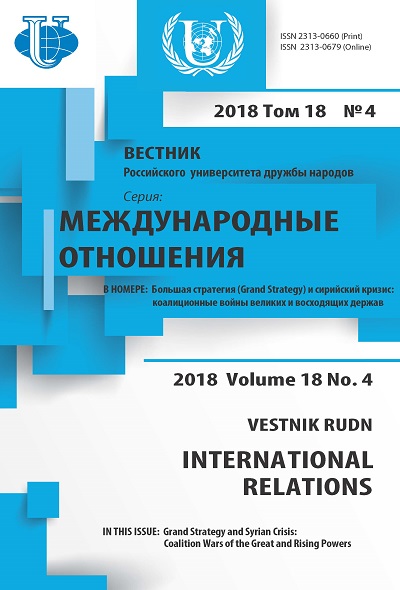Ответственность по защите (R2P): концепция, желательная норма или принцип? Интервью с профессором Алексом Дж. Беллами, Университет Квинсленда (Австралия)
- Авторы: - -
- Выпуск: Том 18, № 4 (2018): Большая стратегия (Grand Strategy) и сирийский кризис: коалиционные войны великих и восходящих держав
- Страницы: 955-964
- Раздел: НАУЧНЫЕ ШКОЛЫ
- URL: https://journals.rudn.ru/international-relations/article/view/20334
- DOI: https://doi.org/10.22363/2313-0660-2018-18-4-955-964
Цитировать
Полный текст
Аннотация
Профессор Алекс Дж. Беллами является директором Азиатско-Тихоокеанского центра ответственности по защите, профессором по изучению проблем мира и конфликтов Университета Квинсленда (Австралия), старшим советником-нерезидентом Международного института мира (Нью-Йорк). Он является автором книги «Косово и международное сообщество» [Bellamy 2002], «Сообщества безопасности и их соседи: региональные крепости или глобальные интеграторы?» [Bellamy 2004], «Понимание миротворчества» [Bellamy, Williams, Griffin 2004], «Международное сообщество и его критика» [Bellamy 2005], «Только войны: от Цицерона до Ирака» [Bellamy 2006], «Борьба с терроризмом: этические дилеммы» [Bellamy 2008], «Ответственность по защите: глобальные усилия по прекращению массовых зверств» [Bellamy 2009], «Ответственность по защите: оборона» [Bellamy 2014], «Обеспечение миротворцев: политика, проблемы и будущее проведения операций ООН по поддержанию мира» [Bellamy, Williams 2013] и «Резня и мораль» [Bellamy 2012]. Алекс Дж. Беллами - один из редакторов журнала «Этика и международные отношения», соредактор журнала «Глобальная ответственность по защите». В своем интервью профессор Беллами рассказывает об институционализации концепции R2P, которая сможет помочь в предотвращении геноцида, военных преступлений, этнических чисток и преступлений против человечности. Профессор Беллами выделяет три категории ситуаций, в которых очень трудно защитить мирных жителей.
Список литературы
- Bellamy, A.J. & Williams, P.D. (2013). Providing Peacekeepers: The Politics, Challenges, and Future of United Nations Peacekeeping Contributions. 1st ed. Oxford University Press
- Bellamy, A.J. (2002). Kosovo and International Society. Houndmills; New York: Palgrave Macmillan
- Bellamy, A.J. (2004). Security Communities and their Neighbours. Regional Fortresses or Global Integrators? 1st ed. Basingstoke & New York: Palgrave Macmillan.
- Bellamy, A.J. (2005). International Society and its Critics. Oxford University Press. doi: 10.1093/0199265208.001.0001.
- Bellamy, A.J. (2006). Just Wars: From Cicero to Iraq. Cambridge: Polity Press. Bellamy, A.J. (2008). Fighting Terror: Ethical Dilemmas. London: Zed Books.
- Bellamy, A.J. (2009). Responsibility to Protect: the Global Effort to End Mass Atrocities. Cambridge: Polity Press.
- Bellamy, A.J. (2012). Massacres and Morality: Mass Atrocities in an Age of Civilian Immunity. Oxford: Oxford University Press. doi: 10.1093/acprof:oso/9780199288427.001.0001.
- Bellamy, A.J. (2014). Responsibility to protect: a Defence. Oxford: Oxford University Press. doi: 10.1093/acprof:oso/9780198704119.001.0001.
- Bellamy, A.J. (2015). International Responses to Human Protection Crises: Responsibility to Protect and the Emerging Protection Regime. RCCS Annual Review, 7. doi: 10.4000/rccsar.609. URL: http://journals.openedition.org/rccsar/609 (accessed: 21.11.2018).
- Bellamy, A.J., Williams, P. & Griffin, S. (2004). Understanding Peacekeeping. 1st ed. United Kingdom: Polity Press.
- Evans, G. (2008). The Responsibility to Protect: Ending Mass Atrocity Crimes Once and for All. Washington, DC: Brookings Institution Press, September.
- Luck, E.C. (2018). Why the United Nations Underperforms at Preventing Mass Atrocities. Genocide Studies and Prevention: An International Journal, 11(3), 32-47. doi: 10.5038/19119933.11.3.1516.
- Ramsey, P. (2002). The Just War: Force and Political Responsibility. Lanham: Rowman and Littlefield.
- Reike, R. (2012). Libya and the Responsibility to Protect: Lessons for the Prevention of Mass Atrocities. St. Antony’s International Review, 8(1), 122-149.
- Tesón, F.R. (2001). The Liberal Case for Humanitarian Intervention. FSU College of Law, Public Law Research Paper, 39. doi: 10.2139/ssrn.291661











